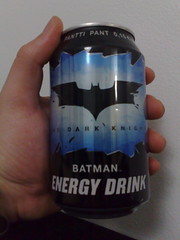Are Energy Drinks Safe?
Need an energy boost? More people than ever are turning to so called energy drinks for increased stamina, alertness, better workouts, late night partying, and who knows what else. It’s now estimated that there are as many as 200 different brands of energy drinks in the U.S., bringing in close to 1 billion dollars in annual sales.
You can probably guess where the kick in these drinks comes from. An 8 oz AMP (a Mountain Dew spin-off) has 77 mg of caffeine. An 8.3-ounce Red Bull contains 70 mg. The University of Florida College of Medicine recently found 105 mg of caffeine in a 6.5 oz can of Starbucks Doubleshot. By comparison, a typical 8 oz. cup of brewed coffee has around 85 mg of caffeine.
The Food and Drug Administration (FDA) recommends limiting the amount of caffeine in a 12 oz soda to 65 mg, but energy drinks are not regulated and many exceed that threshold by a wide margin. Is this much caffeine dangerous?
Since the level of caffeine per ounce is similar to regular coffee, indulging in an occasional energy drink is probably safe for most adults. Problems can arise, however, when energy drinks are added to a diet already loaded with caffeine. Children, pregnant women, those with high blood pressure, or those who are hypersensitive to caffeine should be careful with energy drinks. Since caffeine and prolonged exercise both promote dehydration, using energy drink before such activity is not recommended.
The common practice of mixing energy drinks with alcohol is also strongly discouraged. One is a stimulant, and one is a depressant, and both contribute to dehydration. While many mistakenly believe that extra caffeine negates the affects of alcohol, the reality is that blood alcohol will remain the same with or without the added energy drink, along with your level of intoxication.
Besides caffeine, many energy drink companies have added vitamins, amino acids and other “natural” ingredients, a few of which the impact on health are not well known. Don’t forget sugar- a regular 8.3 oz can of Red Bull has 27 grams, or 110 calories.
If you are looking for a cheap buzz, choose regular coffee over energy drinks (unless you drink at Starbucks). The typical 8 oz energy drink will cost more than .
There is probably nothing wrong with an occasional energy drink for most people, but they may pose problems for those who choose to push the limits.
Dave Elger is a well respected authority within the running community having written hundreds of articles on the topics of running and wellness. You can contact him at http://www.daveelger.com. He also supports the Okinawa Running Club.

